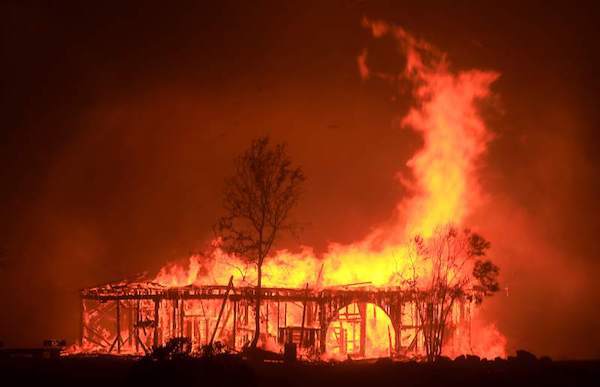
At 3:15am on an October morning, we were roused from bed by a kind neighbor pounding on our door: “Fire! You need to evacuate!” Seeing the bright orange glow of a fire, just a few miles away, we left very quickly and didn’t return for nearly 2 weeks until it was once again safe to return to our home.
Watching my family, friends, and business leaders deal with this deadly fire, I took away 8 Lessons that could help a business deal with disasters.
1. People First
-We didn’t consider putting lives at risk to stay and protect our “stuff”. You can replace stuff…you can’t replace lives.
– A friend who is an operations manager at a large local business lost his home. But rather than focus on his home or on the logistics of his business (that received some damage), he spent 3 days to personally call as many of his employees as possible to check on them, see how they were and offer words of hope, encouragement, and support. People first.
2. Develop a Plan for Dealing with a Disaster
-I’m embarrassed to confess that our family had NO PLAN WHATSOEVER for what to do when we were evacuated. We didn’t know what to take, where key papers were, and which papers were most critical. We didn’t shut off the gas, and we generally just reacted.
– Don’t let your business do the same thing! Have a plan! What is critical that your business maintains? Do you have key redundancies built into your data management? Can you quickly access key files or get backup equipment? Where will you operate immediately, if disaster strikes? Do you have EVERYONE’s contact information?
3. Identify MANY Different “Disaster Scenarios” for Your Business
-I overheard a man who said, “I was prepared for many different disasters: wind, earthquake, water…but I hadn’t prepared for fire.” Have you and your senior team explored many different disaster scenarios for your business? For your customers’ businesses? Do you have a strategy to deal with at least the top handful of potential disasters?
4. Act Quickly
-Friends of ours who lost home had to depart very quickly, but literally within MINUTES, in the middle of the night, they had secured a temporary place to stay for up to 30 days. They acted quickly, and as a result they found a solution, while others who delayed lost out.
-What is your strategic priority when dealing with potential disasters for your business?
5. Accept Help…Even from Surprising Sources
-A friend’s company sought and received help (raw materials) from an unlikely source – their competitor! Don’t limit your thinking regarding potential sources of help to get your business back up and running quickly.
6. Give Help
-In times of loss, many people want time alone to grieve. But many others want to serve…to give back for what they are getting. If your business experiences a loss, find ways that your team can give to others – your community, your customers, even your competitors. Not only might it help your team deal with their loss, kindness does not go unappreciated.
7. Don’t Make Long-Term Decisions, with an Unclear Mind
-One friend who lost a home said, “The one thing we’ve decided is that we are not going to make long-term decisions until we are more clear-minded.” Great advice for your business! Make the short-term decisions quickly, but wait on the long-term decisions until the situation settles down, and you (and your team) can think more clearly.
8. Acknowledge that People Cope with Disaster Differently…but Most All People Have SOME Challenges
-I learned that while people dealt with the fire in many different ways, almost everyone faced challenges. Understand that your team will also react in many different ways. Allow outlets for letting off steam and be keenly aware when someone needs time to “regroup”.
Above all, be prepared well in advance so you can not only survive, but actually thrive when disasters strike.
